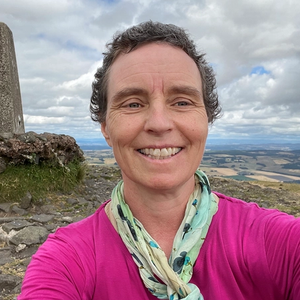The Know AML website uses a third-party service provided by Google that dynamically translates web content. Translations are machine generated, so may not be an exact or complete translation, and Know AML cannot guarantee the accuracy of translated content. Know AML and its employees will not be liable for any direct, indirect, or consequential damages (even if foreseeable) resulting from use of the Google Translate feature. For further support with Google Translate, visit Google Translate Help. The interviews webpage also uses YouTube, where subtitles and translations are generated automatically by AI; please be advised to exercise caution when precise interpretation is required. For further support with YouTube, visit YouTube Help.

Juliet's story
Patient
August 13, 2022
In late December 2020, I applied to become a living donor for kidney transplantation, as a neighbour needed a kidney. The first hospital appointment involved taking many blood samples. That night, there was a phone call from a doctor at Aberdeen Royal Infirmary, UK, asking if I felt well. “Yes”, I responded, privately thinking that my samples must have been mixed up with someone else’s. After all, I felt fine and hadn’t noticed anything amiss.
I was asked to return to the hospital for further tests without delay. Hints were being dropped here and there by the myriad of medical staff whom I saw the following day. Everyone was being very kind. Almost too kind. Between the evening phone call and the moment of diagnosis, I had my suspicions. I’d never heard of a doctor phoning a patient like this. Something very serious, such as cancer, could be the reason. Being a patient involves being very patient. There’s lots of waiting time. This gave me the opportunity to do an online search. I had enough information for me to work out, that leukemia was the most probable disease.
I was alone in the room when the consultant, accompanied by a specialist trainee doctor, entered. He told me the initial tests were not a mistake. I was diagnosed as having acute myeloid leukemia (AML). He covered, step by step, all the things that as patients, we are advised to ask. While it’s a dizzy moment—a shock, I felt neither scared nor angry. I felt matter of fact. People get cancer. I am one of those people. I was curious about what this entailed.
At the time, I was director of my own consultancy firm. I spent the 2 days before Christmas frantically cancelling all my work, issuing invoices for work completed, in addition to telling my family. I had work booked for 15 months in advance. I didn’t have time to think about the diagnosis. Fortunately, I had enough capital in my business to manage the financial hit and not to worry about this aspect of my life.
I set up a CaringBridge webpage, which literally takes a few minutes. In hindsight, it was the best thing for communicating. My parents, husband, and many other relatives don’t “do” social media, so I directed all discussions via that webpage. Also, by knowing everyone who wanted to help, I deliberately asked for advice about good books, films, and music. My family was astonished by the kindness and volume of responses to the posts. It also meant that every well-wish and enquiries were in the “one place”. I wasn’t overwhelmed with enquiries in other ways; you can see my CaringBridge webpage here.
The first round of chemotherapy began on the New Year’s Day of 2021. The second lockdown had begun in earnest. I was allowed no visitors and confined to my room for 24 hours a day. The only times I could leave were for procedures such as scans or X-rays. All the staff wore face masks. I have never seen the full face of any person that has treated me. I have never been able to shake their hand or hug them. I find this tremendously sad.
My AML genetic mutation is rare—IDH2R172. Even though I am young enough for a stem cell transplant, there is no full tissue match on the worldwide donor register. My son and sisters can be haploid donors. After four rounds of chemotherapy, I was measurable residual disease (MRD)-negative and chose to “watch and wait” over a stem cell transplant. It was brilliant to be back at home. One thing I started doing was taking video clips of “normal” things, as well as photos. This included my local river walk, visits to the sea, a multi-day solo hike in Cumbria, UK, and much more. This meant that if I ended up back in hospital, I had living memories of being outside, in nature and in places I love. I returned to working part-time.
In January 2021, I relapsed. The FLAG-IDA (fludarabine, cytarabine, granulocyte colony-stimulating factor, and idarubicin) chemotherapy treatment was not effective. I remained MRD-positive, and without a full human leukocyte antigen (HLA) tissue match. Furthermore, post-chemo complications left me with bowel incontinence. After much soul-searching and careful thought, I decided, again, not to have a stem cell transplant. Instead, I’m on experimental treatment that involves azacitidine and venetoclax cycles.
I made myself redundant, sold my business, and have taken early retirement. I’m indebted to my financial advisor who over the years ensured I had the right insurance that included critical illness cover, and good ethical pension policies. I love being retired, even if it is through ill-health; AML has enabled me to slow down, enjoy life, spend time with husband, family, and friends.
I am grateful for every day I live. I am especially grateful for excellent health (aside from the AML), which enables me to have a high quality of life.
What did you think of this patient story? Let us know at ses_knowaml@scientificeducationsupport.com